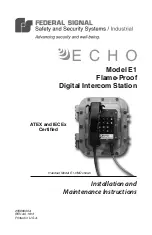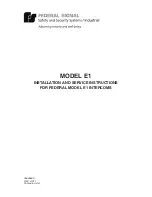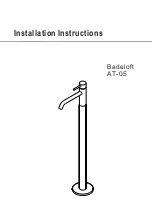
Basic Operation
O
Choose the installation location of your
unit carefully. Avoid placing it in direct
sunlight or close to a source of heat.
Also avoid locations subject to
vibrations and excessive dust, heat, cold
or moisture. Keep away from such
sources that hum, such as transformers
or motors.
O
Do not open the cabinet as this might
result in damage to the circuitry or
electrical shock. If a foreign object
should get into the set, contact your
dealer.
O
Be sure not to handle discs with dirty
fingers. Never insert a disc which has a
crack on the surface.
O
When removing the power plug from the
wall outlet, always pull directly on the
plug, never yank the cord.
O
To keep the laser-pickup clean, do not
touch it, and do not forget to close the
disc tray.
O
Do not attempt to clean the unit with
chemical solvents as this might damage
the finish. Use a clean, dry cloth.
O
Keep this manual in a safe place for
future reference.
This unit has been designed specifically for
reproduction of compact discs bearing the
“
D
” mark. No other discs can be
reproduced.
O
Always place the compact disc in the
disc tray with the label facing upward.
(Compact discs can be played only on
one side.)
O
To remove a disc from its storage case,
press down on the center of the case
and lift the disc out, holding it carefully
by the edges.
How to remove the disc
How to hold the disc
O
Fingermarks and dust should be
carefully wiped off the disc’s recorded
surface with a soft cloth.
Wipe radially
O
Never use such chemicals as record
sprays, antistatic sprays or fluid,
benzine or thinner to clean compact
discs. Such chemicals will do
irreparable damage to the disc’s plastic
surface.
O
Discs should be returned to their cases
after use to avoid serious scratches
that could cause the laser pickup to
“skip.”
O
Do not expose discs to direct sunlight or
high humidity and temperature for
extended periods.
Long exposure to high temperatures
can warp the disc.
O
Do not stick paper or write anything
with a ballpoint pen on the surface of
the label side.
When operating the remote control unit,
point it towards the remote sensor on the
front panel of the unit.
∑
Battery Installation
1. Remove the battery compartment
cover.
2. Insert two “AA” (IEC, R6, SUM-3) dry
batteries.
Make sure that the batteries are
inserted with their positive
≠
and
negative
–
poles positioned correctly.
3. Close the cover until it clicks.
Battery Replacement
If you notice that the distance between
the remote control unit and the player
for correct operation becomes shorter,
it indicates that the batteries are
exhausted. In this case replace the
batteries with new ones.
Precautions Concerning Batteries
O
Be sure to insert the batteries with
correct positive
≠
and negative
–
polarities.
O
Use batteries of the same type. Never
use different types of batteries
together.
O
Rechargeable and non-rechargeable
batteries can be used. Refer to the
precautions on their labels.
O
When the remote control unit is not to
be used for a long time (more than a
month), remove the batteries from the
remote control unit to prevent them
from leaking. If they leak, wipe away
the liquid inside the battery
compartment and replace the batteries
with new ones.
O
Do not heat or disassemble batteries
and never dispose of old batteries by
throwing them in fire.
– 3 –
ENGLISH
Before Use
Read This Before Operating
Beware of condensation
When the player (or a compact disc) is
moved from a cold to a warm place or
used after a sudden temperature
change, there is the danger of
condensation. Water vapor in the air
could condense on the mechanism or
the laser pickup. If droplets of water
form on these parts, correct playback
will be impossible because the laser
cannot read the information from the
disc correctly. To prevent this, if you
are going to use the player in a
condition where condensation could
occur, you should leave the player for 1
or 2 hours after plugging it into an AC
outlet depending on the amount of
condensation. If this is done, the player
will stabilize at the temperature of its
surroundings.
Handling the Discs
Remote Control Unit




































